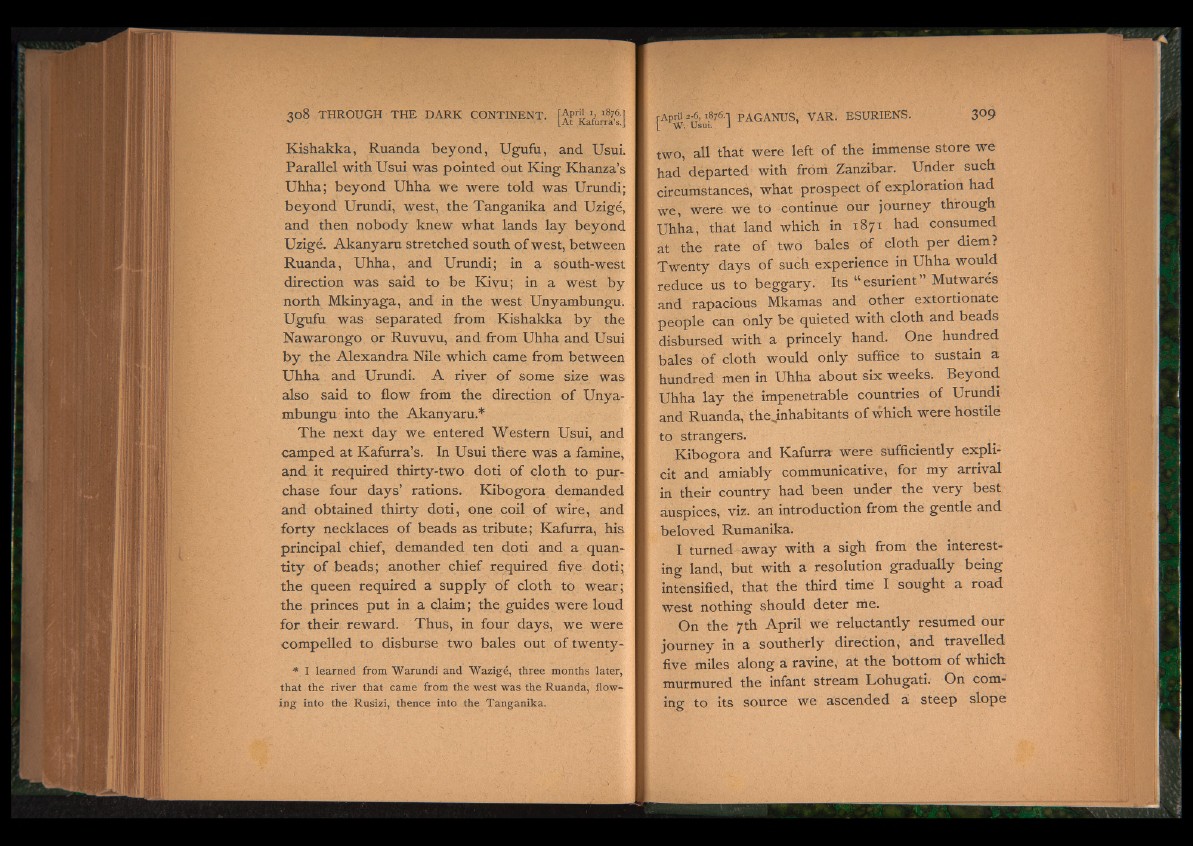
Kishakka, Ruanda beyond, Ugufu, and Usui.
Parallel with Usui was pointed out King Khanza’s
Uhha; beyond Uhha we were told was Urundi;
beyond Urundi, west, the Tanganika and Uzige,
and then nobody knew what lands la y beyond
Uzige. Akanyaru stretched south o f west, between
Ruanda, Uhha, and Urundi; in a south-west
direction was said to be Kivu; in a west b y
north Mkinyaga, and in the west Unyambungu.
Ugufu was separated from Kishakka b y the
Nawarongo or Ruvuvu, and from Uhha and Usui
b y the Alexandra Nile which came from between
Uhha and Urundi. A river o f some size was
also said to flow from the direction o f Unyambungu
into the Akanyaru.*
T h e next d ay w e entered Western Usui, and
camped at Kafurra’s. In Usui there was a famine,
and it required thirty-two doti o f clo th to purchase
four days’ rations. Kib ogora demanded
and obtained thirty doti, one coil o f wire, and
fo r ty necklaces o f beads as tribute; Kafurra, his
principal chief, demanded ten doti and a quantity
o f beads; another chief required five doti;
the queen required a supply o f cloth to wear;
the princes put in a claim; the guides were loud
for their reward. Thus, in four days, we were
compelled to disburse two bales out o f twenty-
* I learned from Warundi and Wazige, three months later,
that the river that came from the west was the Ruanda, flowing
into the Rusizi, thence into the Tanganika.
rApril 2-6,1876.1 pAGANUS, VAR. ESURIENS. 30 9
[ W. Usui. J |
two, all that were left o f the immense store w e
had departed with from Zanzibar. Under such
circumstances, what prospect o f exploration had
we, were we to continue our journey through
Uhha, that land which in 1871 had consumed
at the rate o f twb bales o f cloth per diem?
Twenty days o f such experience in Uhha would
reduce us to beggary. Its “ esurient” Mutwares
and rapacious Mkamas and other extortionate
people can only be quieted with cloth and beads
disbursed with a princely hand. One hundred
bales o f cloth would only suffice to sustain a
hundred men in Uhha about s ix weeks. Beyond
Uhha la y the impenetrable countries of Urundi
and Ruanda, thejnhabitants o f which were hostile
to strangers.
Kib ogora and Kafurra were sufficiently exp licit
and amiably communicative, for my arrival
in their country had been under the v e ry best
auspices, viz. an introduction from the gentle and
beloved Rumanika.
I turned away with a sigh from the interesting
land, but with a resolution gradually being
intensified, that the third time I sought a road
west nothing should deter me.
On the 7th A p ril we reluctantly resumed our
journey in a southerly d ir e c t io n a n d travelled
five miles along a ravine, at the bottom of which
murmured the infant stream Lohugati. On coming
to its source we ascended a steep slope